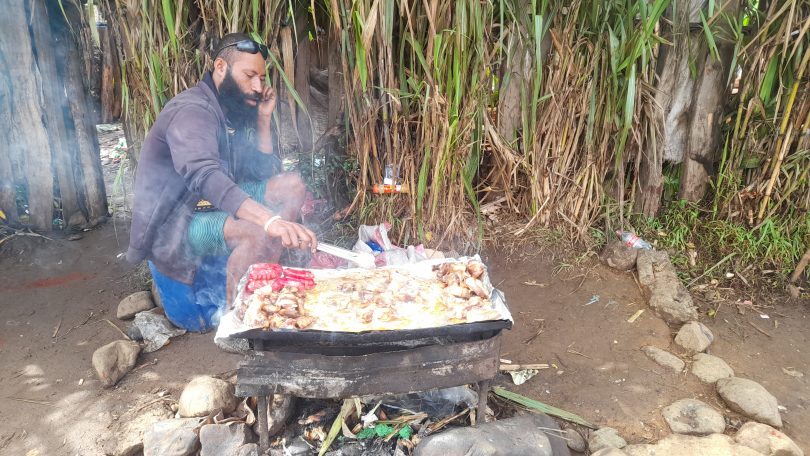The National Capital District Commission (NCDC) has introduced a ban targeting the sale of cooked foods in Port Moresby. This is not the first time the NCDC has implemented such a ban. In the last decade alone, it has implemented several separate bans targeting the trade of betelnut and the sale of cooked foods in the city.
The first ban on betelnut was introduced in 2013, but was lifted in 2017 after it was discovered that betelnut was being smuggled by sea, and NCD reservists were implicated in a shooting linked to the ban.
The second ban, on the sale of both betelnut and cooked foods in public places, was introduced in 2017, about two months after the NCDC Governor had removed the previous ban on betelnut. According to the NCD city manager at that time, the ban was introduced because of “an increase in littering, petty crimes and other issues of health and safety in the city”. This ban continued into 2018 during and after the APEC Summit. The full ban on betelnut was replaced by a partial ban, which allowed sales in markets but banned them in public places, shopping malls and commercial areas.
The third ban, in 2019, outlawed the sale of cooked foods. Like the previous bans, many vendors did not comply with this ban as this activity sustained their livelihoods.
The last ban that was introduced before this latest one was in 2020. Selling of cooked foods had been banned during the COVID-19 state of emergency by the National Pandemic Controller. After pandemic restrictions were relaxed, the NCDC reintroduced its ban on betelnut. Under this ban, offenders faced a fine of K10,000 or three years in jail. The enforcement of this ban, which is supposedly still in place, is questionable given that betelnut is sold almost everywhere and there are no reports of offenders being fined or thrown into jail.
In sum, the earlier bans all failed. They have either been withdrawn or they are still in place, but not being implemented. What are the reasons for this failure?
First, the bans drive these activities underground. With betelnut this creates an opportunity for smuggling to thrive. Bans on cooked foods are either ignored or drive this widespread activity underground and make it harder to regulate.
Second, these bans affect countless households – both producers and sellers. Perhaps some 70-80% of the adult population in the city either use or sell betelnut. Poorly paid workers gathered around a cooking stand sizzling with sausages, potatoes, bananas and kaukau is a common sight in Port Moresby. A ban on cooked foods would deprive these workers of economical meals. Now is not a good time to be introducing a ban on the sale of cooked foods, with the cost of living on the rise due to escalating inflation.
Third, enforcement is always controversial and results in widespread public outcry. At the height of one of the first betelnut bans there were reports of widespread harassment, violence, abuse and in some cases, deaths. The effectiveness of the deployment of NCD police and reservists to enforce these bans leaves a lot to be desired. Their approach is confrontational rather than respectful.
It is disappointing that the NCDC has not itself learnt these lessons. It is also bizarre that the NCDC Governor has already indicated that he will review this decision which has just been made. Wouldn’t it be better to review the past experience before repeating a strategy that has failed? And what does this say about the relationship between the Governor and NCDC management?
A review conducted in 2017, but not yet released, found that a total ban was not the best way forward for all stakeholders, including chewers and vendors. Experience on the ground clearly shows that the earlier ban, instead of improving hygiene, made the problem worse. The betelnut ban made this industry even more lucrative. The winners are the law breakers.
The NCDC management used the Informal Sector Development & Control Act 2004 to justify the introduction of the ban. However, in no way does the law support the imposition of a ban on informal economic activities such as the sale of cooked foods. Furthermore, questions have been raised about the legality of these bans. In fact, the NCDC acknowledged during a stakeholder workshop it organised in 2018 on the betelnut ban, that there were loopholes within the betelnut ban law and therefore the law could not be enforced by the courts.
The betelnut growers of Mekeo-Kuni LLG in Central Province have also challenged one of the NCD betelnut bans in court. That case has not yet been decided, but in 2013 the Lae City Court overturned the decision of the Lae City Council to close down the informal market in Voco Point, a trading hub for market vendors of cigarettes, food, cold drinks, and small goods.
The alternatives to bans are awareness and regulation. The NCDC should deploy trained health inspectors on the streets of Port Moresby, to do routine inspections and promote awareness to ensure that the sale of cooked foods and trade of betelnut conform with health and safety rules and standards, as per the NCDC’s own regulations as well as other relevant laws such as the Informal Sector Development & Control Act 2004.
The NCDC also needs to engage in dialogue with the affected traders. This would be facilitated if vendors were organised into associations. The Gordon’s Market Vendors Association and Little Income Generating Women’s Association are good examples, but need more promotion. The NCDC has made inroads in this area through its work with UN Women under the Safe Cities Program. It should fully institutionalise this program so that it is sustained.
It is clear from Port Moresby’s experience that bans of the sort just introduced are no solution at all. The current ban will be no different. The NCDC needs to take a different approach – one that is centred around awareness, regulation, and the organisation of informal micro-entrepreneurs into vendor associations.
Busa Jeremiah Wenogo is the Manager – Special Projects with the Centre for Excellence in Financial Inclusion (CEFI).
Disclosure: This research was undertaken with support of the ANU-UPNG Partnership, an initiative of the PNG-Australia Partnership, funded by the Department of Foreign Affairs and Trade. The views expressed by the author are not shared by CEFI.




